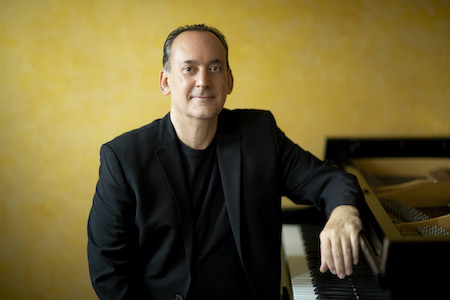Dec 9, 2025 12:28 PM
In Memoriam: Gordon Goodwin, 1954–2025
Gordon Goodwin, an award-winning saxophonist, pianist, bandleader, composer and arranger, died Dec. 8 in Los Angeles.…

“I came to terms with my influences — accepting that I love this or that player, but being comfortable in my own skin, recognizing that I have an identity,” Michael Weiss said.
(Photo: John Abbott)When DownBeat last ran an article about Michael Weiss, the occasion was the 1998 release of his second album, the excellent quartet CD Power Station (DIW). For that report, saxophone icon Johnny Griffin, Weiss’ steady employer between 1987 and 2002, described the pianist, then 40, as “a further branch of the tree” of Bud Powell, Elmo Hope and Thelonious Monk. “There’s a oneness in their approach to comping and soloing,” Griffin opined.
“Michael and the younger cats he plays with play with a certain freshness, compared to the way I feel things,” Griffin added. “It’s more cerebral than the way I choose to play. But Michael also has a feeling of blues in his playing that he didn’t have when he joined me. He didn’t grow up in that atmosphere. That’s all from the street.”
Griffin’s encomium aptly describes the ambiance of Weiss’s latest album as a leader, Persistence (Cellar Music), a title that defines the course of his career. It’s an eight-cut program by Weiss’ quartet (two are trio tracks) with tenor saxophonist Eric Alexander, bassist Paul Gill and drummer Pete van Nostrand. Recorded in July 2021, the release came out in March followed by the vinyl reissue of Weiss’ prior date, Soul Journey (Sintra), recorded in 2000 with a first-call New York septet.
On both albums, Weiss merges old-school idiomatic particulars with progressive aesthetics. He stretches out on Persistence, displaying his characteristically virtuosic pianism and lyric, efflorescent improvisations. His inventions, which feature a variety of clever quotes, display how comprehensively he’s assimilated the language of Bud Powell via Barry Harris in his own argot and tonal palette, an attribute that attracted, apart from Griffin, such master practitioners as Junior Cook, Clifford Jordan, Charles McPherson and Frank Wess. But Weiss is equally fluent in dialects refracted from personal heroes Buddy Montgomery, Horace Silver and McCoy Tyner.
Soul Journey, a more ensemble-oriented project, highlights Weiss’ harmonically and formally challenging compositions, with complexity masked by the composer’s abiding melodic focus.
What animates Weiss is the idea of “bringing forth a basic expressiveness on simple or gnarly structures: how Wayne Shorter solos like Lester Young through the tremendously complex harmonic movement and orchestration on his songs on High Life; how Charlie Parker can play an extremely fast tempo with fast harmonic rhythm and sing simple melodies over the top of it.”
In the process of realizing that aspiration during his persistently soulful journey, Weiss experienced several “aha” moments. One occurred on a 1985 tour with the Junior Cook-Bill Hardman Quintet. “I came to terms with my influences — accepting that I love this or that player, but being comfortable in my own skin, recognizing that I have an identity, a unique shape all my own on the piano, which I couldn’t consciously create artificially.”
Another came when Weiss heard Shorter play “Children Of The Night” at a gig supporting High Life’s 1995 release. “I saw some of the music, and I was blown away by the compositional detail,” he recalled. “It was the biggest epiphany, a huge turning point in my musical development. I liked so many things that I wasn’t finding an avenue to get out because I was limiting my creative output to what I can improvise in a set number of choruses on a given song. My musical tastes were in these separate pots. I’d started composing in earnest, but this showed me clearly how in composition I could combine my classical interests — Scriabin, Szymanowski, Feinberg’s sonatas, for example — and my rock and R&B roots in Led Zeppelin or James Brown or Tower of Power, and Miles Davis’ bands or Bird or Coltrane. It opens up every possible influence I could have. Wayne showed me it’s all one big pot.” DB

Goodwin was one of the most acclaimed, successful and influential jazz musicians of his generation.
Dec 9, 2025 12:28 PM
Gordon Goodwin, an award-winning saxophonist, pianist, bandleader, composer and arranger, died Dec. 8 in Los Angeles.…

Belá Fleck during an interview with Fredrika Whitfield on CNN.
Jan 13, 2026 2:09 PM
The fallout from the renaming of the John F. Kennedy Center for the Performing Arts to include President Donald…

The success of Oregon’s first album, 1971’s Music Of Another Present Era, allowed Towner to establish a solo career.
Jan 19, 2026 5:02 PM
Ralph Towner, a guitarist and composer who blended multiple genres, including jazz — and throughout them all remained…

Peplowski first came to prominence in legacy swing bands, including the final iteration of the Benny Goodman Orchestra, before beginning a solo career in the late 1980s.
Feb 3, 2026 12:10 AM
Ken Peplowski, a clarinetist and tenor saxophonist who straddled the worlds of traditional and modern jazz, died Feb. 2…

Rico’s Anti-Microbial Instrument Swab
Jan 19, 2026 2:48 PM
With this year’s NAMM Show right around the corner, we can look forward to plenty of new and innovative instruments…